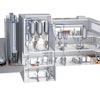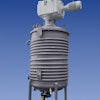
Pet food market trends come and go – but some have staying power.
FONA International’s Melissa Hartley, senior market manager, pet care, and Jennifer Howell, director, regulatory innovation, discussed three of the current popular trends – human grade, CBD/cannabis and plant-based – on Thursday, September 23 at Petfood Forum in Kansas City.
Human grade
“Human grade is the Wild West of the market,” Hartley said. “People consider this the next phase in the humanization of pets.”
Hartley said people think food is better for their pet if it is human grade. There is no industry standard definition of human grade.
Every year FONA International conducts a study of pet owners. One of the questions asked owners to define the term “human grade.” More than half the respondents, 51% of dog owners and 54% of cat owners, said it meant their pets’ food was safe enough for them to eat. The second most popular answer was that the food has high nutritional value, with 35% of dog owners and 38% of cat owners stating that.
Howell said she loves the concept that pet food is more highly regulated than human food. She said pet food is scrutinized much more frequently. The Association of American Feed Control Officials (AAFCO), the independent organization that provides ingredient definitions, label standards and laboratory guidance for state, federal and international feed regulators, has no definition for human grade and the FDA only lists “edible” as a standard.
“As a naturalist, not everything that is edible is good for you to eat,” Howell said. “For a product to be labeled edible for humans it means the conditions must be met for manufacturing, packing and holding that human food.”
Howell said using “human grade” on your labeling means that the pet food meets the FDA edible standard. Howell said very few pet foods can claim that they meet edible human food standards.
CBD/cannabis
Nielsen said the CBD/cannabis industry could be a $225 million category for the pet industry by 2025. FONA asked pet owners if they feed their pets products with CBD. More than half, Hartley said, had no interest in doing that. About 4% of cat owners and 10% of dog owners said they’re providing products containing CBD to their pets.
Howell said that CBD is “absolutely not a legal ingredient in human and pet food or in any topical application.”
Last week, AAFCO stated that CBD use has not been safely established for use by pets or humans, and the FDA states that any animal food with CBD added is prohibited. Howell said the pet food industry has not established the safety of CBD.
“The claims we are making on CBD makes it a drug by default,” Howell said.
Plant-based pet food
Plant-based pet food continues to gain traction. Hartley said the pet food industry mirrors the human food industry.
Hartley said according to FONA’s survey, about 2% of adults identify as vegan and 5% as vegetarian, but 40% are purchasing plant-based meat alternatives as part of their normal diet, most motivated by being sustainable and protecting the environment.
“I love to pick on plant-based,” Howell said, stating plant-based doesn’t mean vegetarian or vegan. Plant-based pet food can still have meat in it. “As a pet parent I do love that there is the potential to have a choice that’s both nutritious for my pet and healthier for the planet.”
There are challenges in this space, Hartley said, including identifying plant-based ingredients pet owners are going to feel comfortable feeding to their pets and making it palatable for the pet.
Howell said the FDA has no statement defining what plant-based means.
“We need to make sure our pets are fed nutritionally,” she said. “We need to avoid the marketing ‘puffery.’”



















